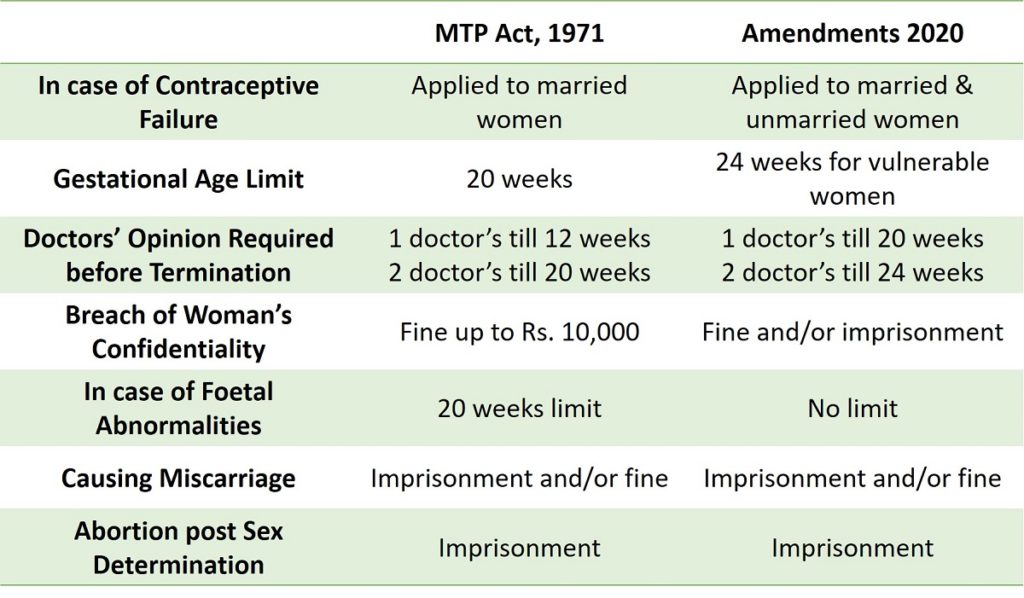Amendment of the MTP Act: Need of the Hour
In the early 1960s, India realized the necessity for a law regarding abortion. Up until that, abortions were considered illegal under Section 312 of the Indian Penal Code, 1860. Almost 50 years ago, in the year 1971, the country finally watched as the Medical Termination of Pregnancy Act took form. The laws allow women to seek abortion as a part of their reproductive right and hence take a step towards gender justice. It also acts as an aid in the prevention of sex-selective abortions. The legalization of medical termination aims to reduce the practice of illegal abortions and resultant maternal mortality.
Abortion was legalized, nonetheless, numerous restrictions were applied to the same. One could perform the termination of pregnancy only up to a period of 20 weeks of gestation. This could not be carried out as a choice, but in certain cases of mental or physical harm to the mother, abnormalities or RH disease to the fetus, exposure to radiation, and sexual assault or rape. Any person responsible for inducing a miscarriage was upheld for imprisonment up to 3 years and/or fine. In case of quickening, however, that is, when a child’s motion is felt by the mother (gestation of 5 months or above) penalty extends to up to 7 years imprisonment and/or fine. Moreover, conducting abortion post-sex-determination can lead to a punishment of 3 to 7 years in jail.

NEED OF THE HOUR
Case 1. A doctor denied an abortion when a minor was found to be 19 weeks pregnant as a result of rape. Till the case was taken to court, the 20-weeks marked surpassed and she was forced to give birth to her rapist’s child. Case 2. A couple caring for a child with special needs was determined with a fetus having Down Syndrome. The court however denied their request of termination due to the exceeding of 20 weeks gestation. Case 3. A fetus was determined with heart defects at 26 weeks but was declined termination in spite of the couple’s plea in court. Case 4. A 10-year-old girl was forced to carry a child-of-rape.
Abortion Assessment Project conducted a 4-year study, revealing a total of only 56% of the total abortions to be safe. In 2015, research published by the Indian Journal of Medical Ethics inferred 6 to 7 deaths of women undergoing unsafe abortions daily. A study by Guttmacher Institute reveals half the pregnancies in 6 large states of India to be unintentional, suggesting high rates of termination. In 2017, The Lancet, the world’s leading medical journal, reported that 1 in 3 of the 48.1 million pregnancies end up in abortion, with almost 78% of them being practiced without professional medical consultations.
Innovations in medical science allow safe abortions to be carried out even beyond the limit of 20 weeks. Practices involving the consumption of abortion pills and using vacuum aspiration have proved to be of no harm to mothers.

MTP AMENDMENT, 2020
The beginning of 2020 was endowed with a progressive unfolding of the already existing abortion law. The Ministry of Health and Family Welfare opted to amend the MTP Act by providing several versatile choices for women. It clearly states the definition of “termination of pregnancy” as a procedure to terminate a pregnancy by using medical or surgical methods. The amendment focuses on upraising the gestational limit of termination of pregnancy from 20 weeks to 24 weeks in vulnerable situations such as rape survivors, victims of incest, differently-abled women, and minors.
Opinion of 1 medical practitioner is mandatory in abortions before 20 weeks of gestation, but in the case of 20 to 24 weeks, 2 doctors must approve the procedure. It is also stated that discretion must be maintained and no information of the woman must be revealed by practitioners. Any woman, who encounters failure of contraceptives, be it married or unmarried, is also eligible for seeking medical aid. If fetal abnormalities are discovered, termination can be carried out at any time during the pregnancy, regardless of gestational time. This contemplates the detrimental effects of unsafe abortions on the death of mothers. The penalty for causing miscarriages remains unaltered.

REFLECTIONS: SILVER LININGS & CRITICISM
The law is forward-looking and empathetic, as it takes into account multiple sensitive issues. India stands amongst selective nations dictating a progressive law regarding abortions. It considers abortions not just on therapeutic, but on humanitarian, eugenic, as well as social grounds. Acting as a milestone, it helps to empower vulnerable and sexual assault survivors. The extension of gestation will provide dignity and justice for those who choose to terminate their pregnancy. Being liberal and accommodative, it provides autonomy and confidentiality to women. It ensures the empowerment of women as no consent of parents or spouse is required if the mother chooses to terminate. Moreover, it promotes clarity to medical practitioners who have resisted performing such procedures in the past.
On the other hand, the amendment grants a substantial amount of power to the medical practitioners, instead of ensuring women a right to exercise their choice. Although termination is permitted till the gestation age of 24 weeks, it can only be fulfilled as per the practitioner’s opinion. It, therefore, becomes necessary for a woman to justify her choice.
There still exists a stigma around the idea of medical termination of pregnancy. More than 80 percent of Indian women (from 7 states) were found to be unaware of the abortion laws. Myths such as abortion bringing dishonor, disallowance of first pregnancy, abortion-causing permanent infertility, and husband’s approval for termination still prevail. The problems of inaccessibility and unawareness need to be tackled by the country, as the government legalizes abortion.
“Abortion is part of being a mother and of caring for children because part of caring for children is knowing when it’s not a good idea to bring them into the world.” – Katha Pollitt

Author

